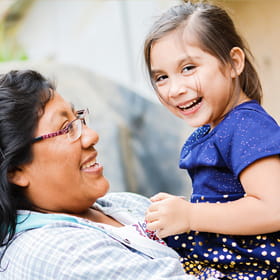Montessori Public Schools
AMS is dedicated to bringing the Montessori Method to public schools nationwide.
Public Montessori programs are growing nationwide. These schools thrive on social and economic diversity, allowing families in any income bracket to choose Montessori for their children.
Many educational programs cannot consistently meet the needs of all children, making school choice of utmost importance. Public Montessori schools, which provide a differentiated approach to learning, can offer that choice.
Public Montessori schools remove financial barriers, enabling families to focus on learning. These public schools have the dual responsibility of adhering to state standards while maintaining the quality of Montessori education in the classroom.
Currently, more than 500 public schools in the United States offer Montessori programs.
They range range from early childhood classes, also known as preschool or pre-kindergarten, to kindergarten, elementary, and middle school/junior high school/high school programs. Some offer Montessori classes school-wide, while others operate as a “school-within-a-school,” sharing a building with classrooms that have a different instructional approach. Montessori can be found in “traditional” public schools, as well as charter and magnet schools.
Dr. Montessori opened her first school in 1907, not for the children of families who could pay for formal education, but for the children who were not from those families. It is through Montessori education in the public sector that we return to the roots of the foundation of Montessori.
Read About The Roots Of MontessoriWhat Makes It Montessori?
Leading Montessori organizations, including AMS, and the Association Montessori Intenationale, agree that quality public Montessori classrooms exhibit specific characteristics, including:
- Mixed-age groups of students
- Teachers credentialed for the age group they are teaching through an accredited Montessori training program
- A full complement of developmentally appropriate Montessori learning materials
- Adherence to the Montessori instructional approach, including child-directed work and an extended uninterrupted work period
How else do leading organizations describe quality public Montessori?

State & National Standards
Publicly funded Montessori programs must follow the same mandates and educational standards required by their district, state, or charter. This includes the requirement that teachers be licensed by the state at the level they are teaching and that students take the same standardized tests as their peers in traditional public schools.
The Montessori Advantage
AMS offers a wide range of resources and services to public Montessori schools:
- Staff who provide expert support to public school administrators, including a school quality concierge who can guide public Montessori programs in achieving and sustaining standards of excellence delineated along the AMS Pathway of Continuous School Improvement.
- Professional development opportunities, such as webinars, workshops, and events for school superintendents that address the interests and needs of public school Montessorians.
- Networking sessions at our annual conference, The Montessori Event, that afford public school Montessorians opportunities to explore issues of relevance and share resources with their peers.
- Representation at a variety of national education events, including the SXSW EDU, the National Black Child Development Institute Annual Conference, and the Annual Conference for Middle Level Education.
- The opportunity to establish open lines of communication with state education departments and state legislators through collaboration on the Montessori Public Policy Initiative.
- Mapping of Montessori curriculum into state standards through the Montessori Public Policy Initiative.
- Support of research specific to the efficacy of Montessori in public school settings.
- The Journal of Montessori Research, freely available to public school educators whether or not they are AMS members.
- Ongoing representation by public school educators and administrators on the AMS Board of Directors, ensuring that the perspectives, needs, and challenges specific to this sector are represented shoulder-to-shoulder with those of independent school educators in guiding AMS vision and governance.
- A community group especially for public school educators on AMS Connect.
Do you have questions about public Montessori programs?






